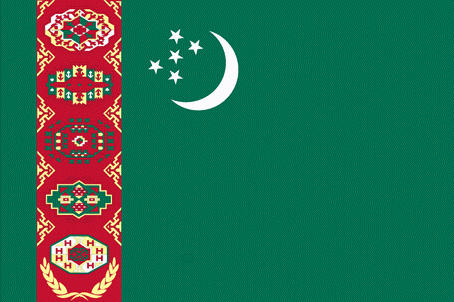Turkmenistan rarely makes the front page of western newspapers. Its leadership in Ashgabat advocates isolation from outsiders and rarely seeks publicity from foreign media.
Authoritarianism is deeply embedded in the country’s culture. Analysts often talk about it as rivaling that of North Korea’s closed autarkic society. Although Turkmenistan’s constitution mandates strict neutrality, its extensive natural gas reserves and strategic location bordering Afghanistan have brought it to the attention of other states in the region, along with the European Union, United States, China, and Russia.
One country stands out among others in its pursuit of a close relationship with the Central Asian state: China. Beijing is playing a dominant role in the country’s foreign relations. It’s expanding the CCP’s influence there through a series of meetings and its acceptance of state corruption. China’s dual goal in Turkmenistan is to secure its natural resources for the Chinese domestic economy and to have a major influence in Ashgabat’s regional affairs as Turkmenistan lies in a critical geopolitical location along the trade route between Asia and Europe and sits next to unstable Afghanistan, according to Paul Goble writing in the Eurasia Daily Monitor. Although the number of countries expressing a new interest in Turkmenistan is increasing, “none has done more and achieved more success than China,” he says. Beijing’s partnership with the state has expanded the communist giant’s opportunities in Central Asia and helped it gainmaccess to critical gas supplies and important transportation routes that China needs for its Belt and Road Initiative (BRI).
Goble points out that Ashgabat is the perfect partner for Beijing. Its authoritarian elite prefer secrecy to open discussion, and like the CCP, resent criticism of its poor human rights record and unofficially-sanctioned corruption. Turkmenistan, in turn, remains silent on Beijing’s brutal repression of Muslims in Xinjiang. Turkmenistan’s rulers have avoided Moscow-dominated integration projects, including the Eurasian Economic Community and the Collective Security Treaty Organization, giving China an opening, especially as Beijing has money to spend on infrastructure projects, according to a report from the Carnegie Endowment for Peace. Russia is not simply relinquishing its position in Central Asia to China.
Nuray Alekberli, a researcher at the Strategic Studies Consulting Company in Azerbaijan, points out that in recent weeks, “Russia, Kazakhstan, and Uzbekistan have been hotly discussing the possibility of establishing a trilateral natural gas union among the three countries.” The region is simmering and in the future competition between Russia and China could become a kinetic conflict.
Turkmenistan opposes any change in international borders and thus backs Beijing on the status of Taiwan. In July 2021 the EurAsia Daily Monitor reported that Turkmenistan welcomes the securitynassistance China gives without the constraints most other countries impose. Over the last two years that relationship has grown stronger. On January 6 there was a meeting between Chinese President Xi Jinping and Turkmenistani President Serdar Berdimuhamedov. The date is significant as it marks the 31 st anniversary of Beijing’s diplomatic recognition of Ashgabat. Salam News called the meeting a “lovefest,” with the two leaders praising each other and signing a laundry list of agreements that would seem to put them on the path to becoming allies.
Their agreements were of two primary types, according to Goble. One covered China’s expanded role in Turkmenistan’s economy and the other Beijing’s hopes that Ashgabat will be an agent for expanding its influence throughout Central Asia. He says the reasons for the first are more obvious; but those for the second are likely to be the more consequential.
China agreed to build a fourth pipeline eastward and Chinese investors will pour money into the economy to support new infrastructure projects covering several economic sectors. In return Ashgabat will increase its sales of gas to China. The agreements indicate that China will likely have an expanded presence in Ashgabat and along the Afghan border. China is not only pressing for expanded economic ties, but also cultural and educational ones to further cement the bilateral relationship.
“The two presidents agreed on three steps that will likely have an enormous impact far beyond Turkmenistan’s borders. First, they agreed that China’s Belt and Road Initiative and Turkmenistan’s New Silk Road initiative should be integrated, something that will expand Beijing’s ability to export goods westward through Turkmenistan via the Caspian Sea to the Caucasus and onward to Europe. Second, they indicated that this east-west route has priority over any other, including the north-south corridor that Russia and Iran are keenly interested in, but that it would not be developed in a way that would preclude others from investing in such a route. And third, they agreed that Turkmenistan will take the lead in organizing a summit meeting for the five Central Asian countries and China, a Chinese “5+1” arrangement that is effectively a rebuff to Russia’s “5+1” plans,” says Goble.
Russian commentators have downplayed China’s influence and activities by casting Moscow as another strategic partner of Turkmenistan. The locus of power, however, has shifted toward Beijing and the money it can provide the country. It appears that any previous “division of labor” between China and Russia is not longer relevant to the Central Asian state and that a new security arrangement is coming into focus. Moscow’s war in Ukraine constrains it from moving troops into the region. Eventually the war will end and Putin and Xi will need to come to an agreement over Central Asia.
Daria Novak served in the U.S. State Dept.
